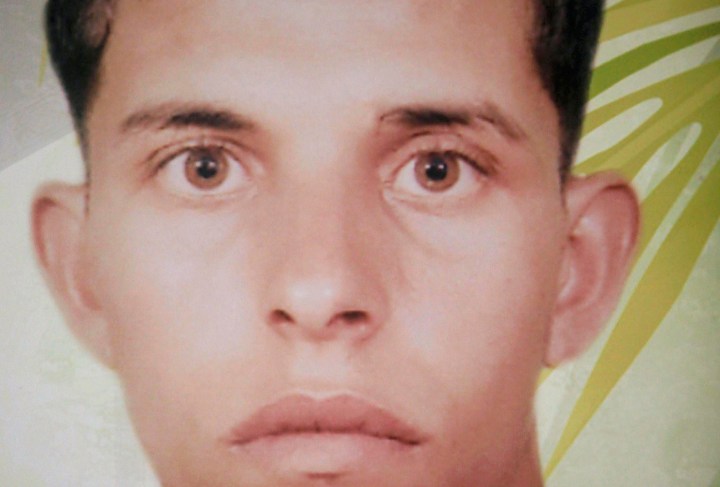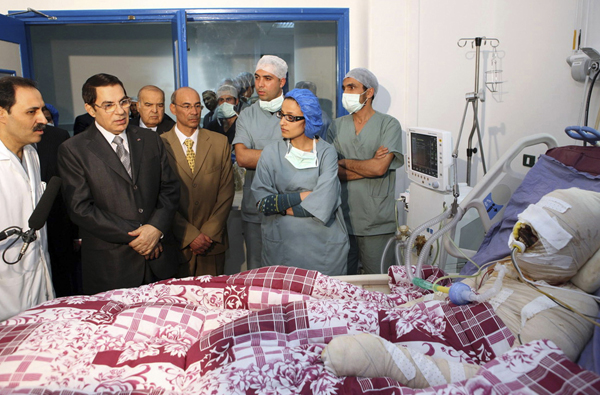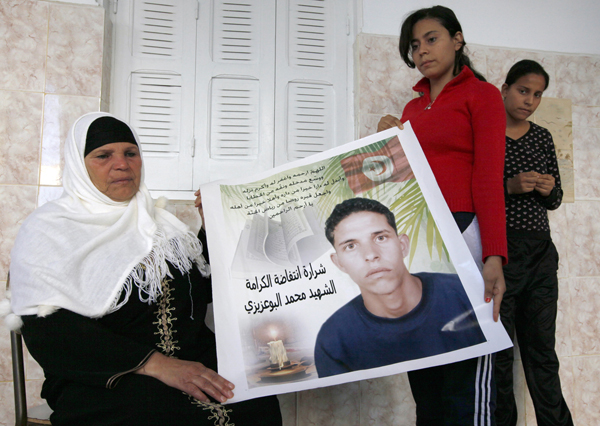Africa
Daily Maverick’s International Person of the Year: Mohamed Bouazizi – a vegetable seller who changed the world

Mohamed Bouazizi lived for only four days of 2011, but his death sparked a historic tumult that dramatically shifted the politics of North Africa and the Middle East from the “convenience of dictatorship” to the chaos of nascent democracies. By KHADIJA PATEL.
In the provincial town of Sidi Bouzid in Tunisia, Mohamed Bouazizi was 10 years old when he became his family’s breadwinner, selling fresh produce in the local market. While he attended a local high school, he did not graduate and his attempts at finding work in the public sector were futile. His day would begin in the town supermarket where he would load his wooden cart with fruit and vegetables and then walk to the local market 5km away. At 26, Bouazizi was used to being accosted by the police, but on 17 December last year, he was pushed too far. A policewoman confronted him on the way to the market and demanded he hand over his scales for want of a trading licence. Bouazizi refused. After a heated verbal exchange, the policewoman reportedly slapped him and then, with the assistance of other officers, forced him to the ground.
His meagre stock of fruit and vegetables, as well as his scales, were confiscated. Publicly humiliated, Bouazizi’s efforts to retrieve his cart were rebuffed. He then sought redress at the local municipal office. After being denied an opportunity to speak to a municipal representative, Bouazizi despaired.
He set himself alight outside the municipal office.
His act of self-immolation spoke the language of desperation. As he lay in hospital, every inch of his body covered in bandages, his story was retold across the world. His desperation resonated with Tunisians grappling with escalating food prices, institutionalised corruption and joblessness.

Tunisian President Zine El-Abidine Ben Ali (2nd L) visits Mohamed Al Bouazzizi (R) at a hospital in Ben Arous near Tunis, December 28, 2010. REUTERS/Tunisian Presidency/Handout
As news of Bouazizi’s self-immolation spread through the town, residents of Sidi Bouzid took to the streets to voice their anger at the local government. A few days later another unemployed man in the town climbed an electricity pole, shouted: “No for misery! No for unemployment!”, then touched the wires and electrocuted himself.
In an effort to contain the protests, security forces sealed off the town, but within days protesters in another town set alight police cars, a railway locomotive, the local headquarters of the ruling party and a police station. Tunisia was slipping out of the control of its heavy-handed security forces.
As protests in Tunisia began to ripple beyond the town of Sidi Bouzid, the young street vendor was fast becoming a household name in the Arab world. When he set fire to himself, he had also ignited a fervour in the Tunisian people that was comparable only to the anger that preceded the fall of the Romanian dictator, Nicolae Ceaucescu in 1989.
After 22 years in power Ceaucescu’s rule came to an abrupt end after government officials harassed an ethnic Hungarian priest over a statement he had made. Demonstrations broke out in protest against the priest’s harassment, but the priest himself was soon forgotten. Demonstrations soon morphed into protests against the Ceaucescu regime.
So too in Tunisia, people began to take to the streets, risking imprisonment and braving the bullets of security forces in protest against the brutality meted out to Mohammed Bouazizi, but their demonstrations soon transformed into a popular uprising against the Tunisian government.

Manoubia Bou Azizi, the mother of Mohamed Bouazizi, holds a banner with her daughters Samia and Besma during an interview with Reuters at her home in Marsa district, north of Tunisia. REUTERS/Jamal Saidi
While Bouazizi languished in hospital, President Zine el Abidine Ben Ali, desperate to blunt the anger vented against his government and security forces, visited Bouazizi on 28 December. Newspapers around the world splayed pictures of Ben Ali visiting him in his hospital room, the contrast between the street vendor’s bandages and the dictator’s suit further enraged Tunisians. Ben Ali ordered the arrest of Faida Hamdi, the female officer who allegedly accosted Bouazizi, but protesters were unimpressed.
Now this was an uprising that refused to be thwarted and after Bouazizi died on 4 January, there was no holding it back.
Ben Ali bowed to the demands of protesters, promising political reforms, lifting draconian censorship laws and finally on 14 January, just 10 days after Bouazizi died, Ben Ali’s 23-year rule of Tunisia was over. He fled to Saudi Arabia, leaving Tunisia to determine its political future without him.
Mohammed Bouazizi held none of the fancy dreams of democracy and freedom. His was a daily battle to feed his family. Speaking to Time in January, his aunt Radia Bouazizi said his dream was to save enough money to be able to rent or buy a pickup truck. “Not to cruise around in,” she said, “but for his work.” Her nephew was a vegetable seller. “He would come home tired after pushing the cart around all day. All he wanted was a pickup.”
Bouazizi, the young street vendor from a provincial town in Tunisia, had inspired a tumult that would embolden millions more in their fight against the shackles of dictatorship.
As the main square in Tunis was renamed after him, the Tunisian people battled to secure their revolution and safeguard their hard-won freedoms.
Activists and politicians, barred from the country, returned, optimistic about the chances of democracy in the new Tunisia. As excited political haggling over Tunisia’s future began, so too it remained for the Tunisian courts to decide the fate of the policewoman who accosted Bouazizi.
On 19 April, the charges against Faida Hamdi were dropped after Bouazizi’s mother withdrew the family’s complaint against her. A Tunisian court had earlier found Hamdi innocent of all charges laid against her when it emerged that only one person claimed to have seen the slap – a fellow street trader who bore a grudge against her – while four new witnesses testified that there had been no physical confrontation.

Tunisia’s interim Prime Minister Hamadi Jbeli, Ennahda party’s leader Rached Ghannouchi and Mannoubia Bouazizi (front L-R), mother of Mohamed Bouazizi. REUTERS/Zoubeir Souissi
On 25 October, nine months after Ben Ali fled the country, Tunisians elected a body to write a new constitution. Ushering in a new political order in the country, the Islamist Ennahda Party, which had been banned under Ben Ali, won the most seats and partnered with the liberal Congress for the Republic and the left-of-centre Ettakatol Party to form a ruling coalition and divide up the top posts between them.
Yet, the greatest legacy of Bouazizi may not actually lie in his own country. The remarkable vigour with which Tunisia’s revolutionary spirit spread through the Arab world would become known as the “Arab Spring”.
As Tunisia celebrated the end of Ben Ali’s rule, Egyptians thronged to the streets, resolute in their demonstrations against a stubborn dictatorship.
Chanting, “Freedom, liberty, bread” these people proved the plainness of the incentive to revolt against dictatorship. A remarkable 60% of the region’s population is under 30 and in Egypt the substantial chunk of that young population was severely stymied by the failure of Hosni Mubarak’s government to provide adequate schooling. These were people inadequately educated and then rebuffed by an economy that did not offer the jobs to match the abilities or aspirations.
Last December, the official unemployment statistics in Tunisia reported 13% of the population as unemployed. The reality, however, was said to have been far more severe, especially among university graduates. This then was a generation caught in limbo, with all the demands of adulthood, but none of its means – a generation for whom Mohamed Bouazizi became an unwitting flag bearer.
The uprising in Tunisia, as in Egypt, Yemen, Libya and Syria may appear to have been sudden and unexpected to outsiders, but to the legions of the unemployed, uneducated and underfed it was a long time coming.
Acts of self-immolation, similar to Bouazizi’s, have been reported everywhere from Mauritania to Tibet. After all, police brutality, crippling levels of unemployment, rising food prices and poor education systems are hardly unique to the Middle East and North Africa. DM
Read more:
- The slap that sparked a revolution in The Guardian;
- Fedia Hamdi’s slap which sparked a revolution ‘didn’t happen’ in The Guardian;
- The tragic life of a street vendor in Al Jazeera;
- Bouazizi: The Man Who Set Himself and Tunisia on Fire in Time
- Tunisia’s Forgotten Revolutionaries in Foreign Policy.
Main photo: A portrait of Mohamed Bouazizi is seen on a poster in this handout photo released by Bouazizi’s family at their home in the Tunisian town of Sidi Bouzid. REUTERS/Handout



















 Become an Insider
Become an Insider